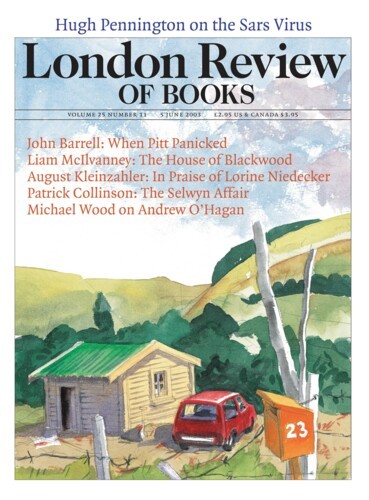It must be summer. It’s chucking it down with rain, and the words ‘Big Brother’ have returned to the front pages of the tabloids squatting soggily in newsagents’ stands. As far as American network television is concerned, however, summer is already over: the autumn schedules have been put on lavish display so advertisers can decide where to bestow their munificence. And of the 38 brand-new programmes on the six major channels, none is a ‘reality’ show. This doesn’t mean, however, that the slough of degeneracy has at last been traversed and civilisation is advancing to the sunlit uplands; nor indeed that, waist-high in sludge, civilisation has wisely decided to turn back and return to the sunlit uplands it thinks it left behind. Survivor will return, so viewers can gloat over Joe and Jo Public struggling through swamps and stabbing each other in the back as they strive after wealth and celebrity; also gracing America’s screens for a further season will be American Idol, Joe Millionaire, Fear Factor and The Bachelor, the other most successful examples of what Salman Rushdie has called the ‘unashamed self-display of the talentless’. On US cable, moreover, there is Reality Central to look forward to, a ‘new 24/7 cable television network devoted solely to the reality television programming genre and its shows, news, stars and fans’, which has been set up and even funded by the has-beens of the ‘genre’, its soi-disant stars who have clubbed together to enable themselves to remain on TV.
There’s little evidence that the appetite for reality TV on this side of the Atlantic has abated. Big Brother 4 received more applications than any of its predessors. The Sun – which, just when you think it can’t get any tawdrier, will pull another grubby hanky from its sleeve – has proffered a bounty of £50,000 to the first (straight) couple to have sex on the show. That Big Brother is still a virgin, unlike most of its Continental cousins, clearly chafes at the patriotism of the nation’s favourite paper.
More intelligent consideration of the phenomenon can be found in Shooting People: Adventures in Reality TV by Sam Brenton and Reuben Cohen (Verso, £12), a concise, unhysterical and damning critique. They begin with the story of Sinisa Savija, the first person to be booted off the first reality TV show, Sweden’s Expedition Robinson, in 1997. A month after he was evicted, he killed himself. The producers of the programme were found not to be responsible for his death. (The show, which had been held back for the duration of the inquiry, duly went out. It was crazily popular. Spin-offs proliferated around the globe, and in the summer of 2000, in the United States, 51 million people tuned in for the final episode of Survivor.) Though those responsible for the progammes can’t be held responsible for a contestant’s subsequent suicide, it’s hard to doubt that appearing on one of the reality shows has the potential to be peculiarly and unpredictably distressing.
‘They are going to cut away the good things I did,’ Savija told his wife when he got home, ‘and make me look a fool.’ No doubt they would have done. It isn’t easy to depict, convincingly and sympathetically, people as complicated characters, with intricate interior lives, interacting with each other in interesting ways: only the best novelists and dramatists manage it. The housemates on Big Brother are performing themselves, without a script; for a cogent story to be made out of their relationships, they have to be edited into types. The programme makers get away with this because the audience accepts that the caricatures on display are ‘real people’. This bogus notion of authenticity compensates for the banality of the drama: sure it’s clichéd, but it’s true. Much tabloid journalism is an easy appeal to this easy sentiment, so it’s little wonder that the Sun should have latched so gleefully onto the ready-made stories that Big Brother provides.
Or it may be that reality TV gets closer to reality than we’d care to acknowledge. If the notion that we have intricate interior lives is an illusion, fostered in part by being exposed at an impressionable age (what age isn’t impressionable?) to too much fiction – if ‘character’ only really exists in plays, novels and movies – then shows such as Big Brother strip these self-deceptions away to reveal people as they really are: a vulnerable accumulation of the perceptions of others. Anyone would look stupid in the Big Brother House; the only thing that really singles the housemates (and 10,000 other applicants) out as stupider than everyone else is wanting to be on the show in the first place.
Either way, I can’t say I won’t be tuning in.
Send Letters To:
The Editor
London Review of Books,
28 Little Russell Street
London, WC1A 2HN
letters@lrb.co.uk
Please include name, address, and a telephone number.

